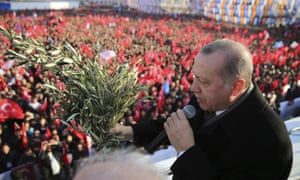The U.S. is weighing sanctions on Venezuela’s oil sector, Rex Tillerson said in Argentina Sunday, as he continues a South America trip that’s quickly being dogged by President Donald Trump’s threat to cut aid to the countries the Secretary of State is visiting.

Tillerson’s trip tour comes as Trump’s threats to cut aid to countries producing drugs and shipping them to the U.S. reverberates around the region. Speaking at a U.S. Customs and Border Protection event on Friday, Trump said he wanted to “stop the aid” to countries that didn’t stem the flow of drugs.
Three Latin American countries — Peru, Bolivia and Colombia — are key producers of the plant needed to manufacture cocaine — and the U.S. has spent billions of dollars trying to eradicate the crops there.
Tillerson will face new questions about Trump’s position and possible actions during his stops in Peru and Colombia in the coming days. Colombia received $325 million in U.S. foreign aid in 2016, second in the region after Haiti, while Peru got $96 million, U.S. government figures show.
Counter-Narcotics Funds
In both countries, the most money was directed at counter-narcotics programs, according to figures provided by the U.S. Agency for International Development. That means that the U.S. would likely undercut the very efforts aimed at stopping the flow of drugs if Trump made good on his threat.
Tillerson’s trip so far has been aimed at gathering more support from countries such as Mexico, Colombia and Peru to redouble their anti-narcotics efforts, a message that risked being undermined by Trump’s comments.
A senior State Department official, who asked not to be identified in order to speak frankly, called Trump’s remarks “unhelpful.” The president’s tone was far more confrontational than that adopted by Tillerson, who acknowledged on the trip that the U.S. also bears responsibility because American demand creates a market for the illegal drugs.
“U.S. demand for drugs drives this violence and this lawlessness,” Tillerson said Feb. 1 as he kicked off the trip in Austin, Texas, with a speech outlining his South America policy. “We acknowledge our role as the major market for illicit drug consumption and the need for shared approaches to address these challenges.”
Congressional Purse-Strings
Trump has repeatedly threatened to cut foreign aid to other countries, and he recently followed through with a move to suspend security assistance to Pakistan. But his proposals for more sweeping cuts to such aid have generally met with bipartisan opposition in Congress, which controls most overseas assistance.
In Argentina on Sunday, Tillerson nonetheless sought to stay on message, saying the U.S. was “grateful for the close cooperation and collaboration” it has in combating trans-national criminal organizations. He said the U.S. is taking “a very regional approach to beginning to address these illicit activities.”
While Tillerson will likely face pointed questions from Peruvian leaders in a visit to Lima on Monday, further isolating Venezuela was a central focus of his stop in Buenos Aires Sunday. He said he’d also raised the issue with Mexican officials during a visit to Mexico City on Feb. 2 on the way to Argentina.
Electoral Abuses
The fact that Tillerson has raised the possibility of oil restrictions in both stops of his trip so far suggests the administration is seriously weighing an embargo, a step it’s so far avoided even as it targets Venezuela’s financial sector and sanctions top officials.
The U.S. has imposed sanctions on more than a dozen top Venezuelan officials — including Maduro himself — as part of efforts to punish Venezuela after numerous accusations of electoral abuses and human-rights violations.
Still, sanctioning the oil sector could potentially damage U.S. companies and cost U.S. jobs. Venezuela is a major source of crude imports for the U.S. market, though the amount has been declining in recent months. The country is also a key market for American oil refiners.
Tillerson said discussions about sanctions are looking at “how to mitigate the impact on U.S. business interests.” He said the U.S. also recognized that other countries in the region could be harmed by such a move.
In considering oil sanctions, the U.S. must also weigh concerns from Caribbean countries, which rely on cheap Venezuelan oil. Tillerson is expected to raise the issue when he visits Jamaica’s capital, Kingston, on Feb. 7 before heading back to Washington.
https://www.bloomberg.com/news/articles/2018-02-04/tillerson-says-u-s-weighing-sanctions-on-venezuelan-oil-sector
![Israel issues deportation notices to African migrants Israel is home to about 40,000 asylum seekers, according to government figures [File: Reuters]](http://www.aljazeera.com/mritems/imagecache/mbdxxlarge/mritems/Images/2017/11/21/c0b032a00f104c8a993c5d3fcd901a26_18.jpg)





